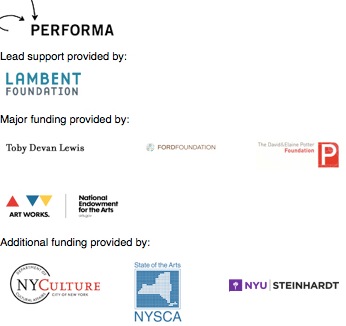Paradiso: Performing The Renaissance
Friday, April 24, 2015, 1–5:30pm
Saturday, April 25, 2015, 1–5:30pm
Presented by the Performa Institute in association with the
NYU Steinhardt School of Culture, Education, and Human Development
Einstein Auditorium, Barney Building
34 Stuyvesant Street
New York
Performa is pleased toannounce “Paradiso: Performing the Renaissance,” a groundbreaking conference historically situating and addressing the vibrant experimentation and interdisciplinarity that characterizes contemporary artists’ performance.
The conference extends Performa’s curatorial research platform to include “the Renaissance,” an extraordinary historical precedent to today’s performance art practices, when artists, architects, and scientists worked across genres, creating live events that significantly contributed to civic and cultural life.
As with previous Performa biennials, which each use a singular historical period (Italian Futurism in 2009, Russian Constructivism in 2011, and Surrealism in 2013) to address the importance of live performance in shaping the art and ideas of 20th-century art, the Renaissance will serve as the main historical anchor for the upcoming Performa 15 biennial. Our investigation into this period has included a series of seminars, readings, and scholarly meetings with artists and academics throughout the year, and culminates in “Paradiso: Performing the Renaissance,” the Performa Institute’s capstone event with presentations by a select group of world-renowned specialists whose interests straddle both the Renaissance and its relevance for contemporary art and culture today.
Participants include Noam Andrews, Ph.D Candidate, Department of the History of Science, Harvard University, and Jane and Morgan Whitney Fellow, Department of Drawings and Prints, Metropolitan Museum of Art; Pauline Curnier Jardin, artist; David Hallberg, Principal Dancer, Bolshoi Ballet and American Ballet Theater; Lars Jan, artist; Zach Layton, musician, curator, and PhD candidate at Rensselaer Polytechnic Institute; Kate Lowe, Professor of Renaissance History and Culture and Co-director of the Centre for Renaissance and Early Modern Studies, Queen Mary, University of London; Alexander Nagel, Professor, Institute of Fine Arts, New York University and Editor-at-Large, Cabinet magazine; Shahzia Sikander, artist; Pamela Smith, Seth Low Professor of History and Director of the Center for Science and Society, Columbia University; Claire Tancons, curator, researcher, and writer with a focus on Carnival, processional performance, public ceremonial culture, civic rituals, and popular movements; Rebecca Zorach, Professor of Art History, University of Chicago; and Our Literal Speed, a text-and-art and media opera collective.
Tracing the correlations between contemporary art and the Renaissance, we traverse a medley of themes that allow for new understandings of this pivotal historical cultural movement and our own time, including public spectacles such a processions, parades, and pageants and the artist’s role as creator and director of these events; the African presence in Renaissance Europe; performance in the course of history as an open-ended medium realized by artists unconcerned with the limitations of more established art forms and interested in creating a presence for their works in important social contexts; the profound cultural, economic, and artistic interactions and exchanges between Western and non-Western cultures during the Renaissance; explorations of the body during the Renaissance and its relation to art and performance; the “theater of nature”; unexpected similarities between polyrhythmic musical styles in the 14th and 20th centuries; and propositions for new methods of teaching Renaissance art history that are responsive to the ways artists create today.
Free admission with reservation at www.performa-arts.org. Indicate the dates you will attend with your reservation. Seating is limited and available on a first-come, first-served basis. A detailed schedule of the conference is available here.
Performa Institute
Launched during the Performa 11 biennial, the Performa Institute is a platform for the research and scholarly components of Performa and also an experimental laboratory for artists. The Institute creates a space for the exchange, presentation, and exploration of ideas and knowledge, with a focus on the study of art history and the critical role of performance—by visual artists, choreographers, filmmakers, composers, and playwrights—in shaping that history. Forging a new intellectual culture around contemporary performance, the Performa Institute provides lectures and other public programs year-round, as well as publications, a repository of digital and print archives, and fellowships.
Performa
Performa is a multidisciplinary non-profit arts organization, founded by art historian RoseLee Goldberg in 2004, dedicated to exploring the critical role of live performance in the history of 20th-century art and to encouraging new directions in performance for the 21st century, engaging artists and audiences through experimentation, innovation, and collaboration. Part of Performa’s mission is to present a biennial of visual art performance in New York City that illuminates the critical role of performance in the history of art as well as its enormous significance in the international world of contemporary art.
For more information, visit www.performa-arts.org.
Media contact
Concetta Duncan, Sutton PR: T +1 212 202 3402 / concetta [at] suttonpr.com.


